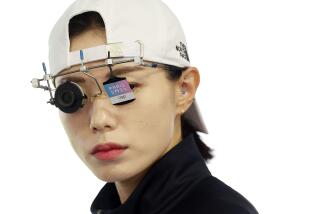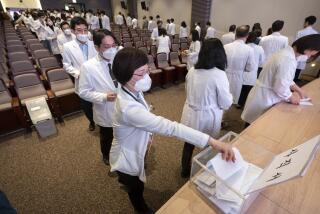South Korea Expects Its Athletes to Play a Big Part in Olympics
- Share via
SEOUL, South Korea — When Kim Sung Jip was training for the 1948 London Olympics, where he won a bronze medal in weightlifting, he had to use makeshift weights, fashioned by a Korean ironsmith, that bore only a resemblance to standard Olympic weights.
“The only gym we had in the whole country was at the YMCA,” he recalled. “And we weightlifters practiced in its backyard on the bare ground. No collective training was conducted at all. Indeed, the biggest problem the athletes had was getting enough food to eat.”
However, for today’s South Korean athletes, hoping to participate in the 1988 Seoul Olympics, virtually nothing is too good. Kim, now 66, who also won a bronze at the 1952 Helsinki Games, runs the training program for South Korea at the Taenung athletes’ village on the northeast outskirts of Seoul.
It is a 65-acre, resort-like compound filled with standard Olympic training equipment. There are seven Olympic-size gymnasiums, an Olympic-standard swimming pool, a composition track and an artificial turf field. And $1 million worth of scientific instruments have been imported to measure physical strength, pinpoint psychological problems and computerize individual training programs.
Kim, who was head of the South Korean team at last year’s L.A. Olympics, said with obvious pride, “The weightlifters are all using imported Olympic-standard equipment. Today, the problem is making sure that the athletes don’t eat too much.”
The difference between 1948 and 1988 is not just the tremendous economic growth that has brought South Korea to the brink of entering the advanced industrialized world. A large part of it can be accounted for by the fact that South Koreans have an almost desperate need to win international attention and acclaim and feel that their athletes must do well in the Seoul Games.
Centuries during which Korea disappeared from the consciousness of the world in self-imposed isolation, the years of colonial rule under Japan, national divisions, wars and grinding poverty all have contributed to Koreans’ inferiority complex, if their not their fierce nationalism.
And just staging the Olympics, South Korean officials say, will not be enough.
Sports Minister Lee Yong Ho said the Olympics will give South Koreans an opportunity to “confirm to ourselves that we as a nation have something to be proud of.” And the number of medals South Koreans will win in Seoul has become very important here.
At the L.A. Olympics, South Korean athletes won 19 medals, more than the nation had accumulated in all of the Games in which it had participated from 1948 until 1984, and a crowd of more than 2 million people--believed to be the largest in South Korea’s history--greeted them as they paraded through Seoul on their return. President Chun Doo Hwan and his wife met the athletes at City Hall and later invited them to the presidential Blue House.
In the euphoria of the triumphant return, Lee, the sports minister, said South Korea should be able to finish seventh or eighth in medals in the 1988 Olympics and surpass Japan, a nation with three times the population of South Korea. At Los Angeles, with the Communist Bloc boycotting, South Korea finished 10th in number of medals; Japan was tied for sixth, with 32.
At Taenung, that goal is translated into year-round 6 a.m. to 6 p.m. training, with lights out at 10 p.m. Vacations for the athletes last only long enough for them to participate in national and international meets, although, unlike most South Korean workers, the athletes do get two-day weekends off.
Throughout South Korea, 850 athletes, ranging in age from 14 to 34, are in training for the Asian Games and the Olympics under the guidance of 100 trainers and coaches. After an expansion in October, up to 600 will be trained at Taenung alone, Kim said. A second training camp, the Chinhae athletes village, which can handle 250 athletes, was opened last October in the southern part of the country.
Last year, the government gave Taenung a $26 million budget, $2.4 million of which was allocated to training alone. About $19 million went to construction of facilities. This year, although the overall budget was reduced to $6.7 million because of reduced need for new construction, funds for training were raised to $4.3 million.
A nearby college will move to a new location in October and its buildings will be taken over by the Olympic organization to provide more dormitories for athletes and more space for the Korea Sports Science Research Institute, the scientific side of the effort to “manufacture” medalists.
Its 20 researchers and three professional technicians are devoting all of their attention to grooming the athletes for the Asian Games and the Olympics. One of their products is a 1,023-page encyclopedia detailing the strengths and weaknesses of each South Korean athlete and prescribing individual training programs. It is updated every six months, Kim said.
Foreign coaches are being brought here--at a cost of $323,000 this year--to help train Korean athletes. This year, 27 foreign coaches in 20 sports are being called in, including a former Soviet boxing coach, a defector who is now a Canadian citizen. He is training an already-strong South Korean boxing team. A Japanese coach in wrestling, another sport in which Koreans excel, also has been invited. “We want to know the enemy,” Kim said.
Korean coaches and teams also are being sent abroad for special training “because of the increased expectations of the people with the Asian Games and the Olympics coming,” he said. “Both the trainees and the coaches have a keen sense of responsibility.”
South Korea’s medalists in Los Angeles, all of whom are in training for the Seoul Games, as well as hundreds of others recruited from a series of national sport events covering children down to the fourth grade, have been given unprecedented new incentives.
Early this year, Park Jung Ki, president of the Korean Amateur Athletic Foundation, the track and field governing body, announced that track and field medal winners at next year’s Asian Games will be given trust funds ranging in value from 50 million won ($56,818) to 100 million won ($113,636) to enable them to devote themselves to training for the Olympics.
And for the Olympic marathon in 1988--an event that is always a highlight of the Games but, in recent years, a disappointment for South Korea--Park announced that any South Korean marathoner breaking 2 hours 9 minutes will receive 150 million won ($170,454) in a trust fund. He also announced trust fund prizes of $113,636 for times below 2:10, $90,090 for breaking 2:12, and $79,545 for breaking 2:13.
Regardless of time, if a Korean wins the Olympic marathon in 1988, he will get $113,636 in a trust fund and a titular job as a section chief at the Korean Electric Power Co., said Park, who is president of the state-run national power monopoly.
More to Read
Go beyond the scoreboard
Get the latest on L.A.'s teams in the daily Sports Report newsletter.
You may occasionally receive promotional content from the Los Angeles Times.






